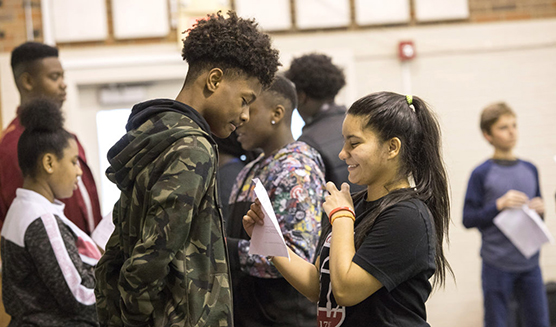A new high school leadership development program has seen positive results in its first six months.
Georgia Possible is designed to help students have success in the classroom and after graduation. Starting freshman year, students will participate in the program for three years. After nine sessions, administrators from UGA and Clarke County are pleased with the partnership and excited for the future of the program.
“I am delighted that the University of Georgia and the Clarke County School District have partnered to create this innovative program,” said UGA President Jere W. Morehead. “I look forward to the many outstanding contributions that these students will continue to have in our community.”
Administrators in the school district have seen major impacts.
“The inaugural year of Georgia Possible has been a great success for our students in the Clarke County School District. The experiences that our students have been able to participate in this year have left an indelible mark on the academic and social trajectory of these students,” said Demond Means, superintendent of the Clarke County School District. “The impact has gone well beyond the selected students in the Georgia Possible program as these students have served as exemplary role models for their peers.”
The program started in September 2018. Students were nominated by their school’s principal based on factors such as personal drive, attitude and demonstration of leadership potential, among other traits. Sessions are taught by experts at the J.W. Fanning Institute for Leadership Development, a unit of UGA Public Service and Outreach.
“Leadership development is about self-identity and personal growth, and by developing leadership skills in high school students, we can enhance not only their ability to excel in high school but also their ability to take advantage of the many options they will have as they look beyond high school graduation,” said Matt Bishop, director of the Fanning Institute. “We want to develop leadership skills in these students such that they know anything is possible.”
Program activities vary from group work in classrooms to trips to campus. Earlier this year, students visited the Richard B. Russell Building Special Collections Libraries to explore digital archives and study Georgia’s leaders, including Charlayne Hunter-Gault and Jeannette Rankin.
Another session focused on the importance of setting goals. Students brought their progress reports from fall semester, then set goals to reach before the next progress report.
Fanning faculty have worked with the Clarke County School District to customize the institute’s youth leadership curriculum that is used by individuals, schools and communities across the state.
“We’re using some activities from our leadership curriculum, but we are tailoring this curriculum to the academic and advising calendar as well as to the specific goals and concerns of the students,” said Lauren Healey, public service associate and program manager of Georgia Possible. “It’s been a great partnership with the schools and with so many departments on campus.”
The students have already noticed a change in themselves. For Jennifer Catalan of Cedar Shoals, the program has encouraged her to look toward the future.
“I want to be able to plan what I do in my life,” she said. “I still haven’t found exactly what I want to do, but this is a good opportunity to help set my goals.”
Enock Maganda of Cedar Shoals said the program has helped with decision-making.
“A lot of the things they repeat – like ‘be good in the classroom’ and ‘set an example’— I think those things are important this day and age,” he said. “If we don’t do those things, the younger generation is not going to have anyone to look up to and they’re going to make the wrong decisions. We don’t want that for the future.”
Students noted their favorite part of the program is the interactive nature of the sessions, allowing them to work with their classmates and with students from the other school. Georgia Possible has become a networking event for high schoolers who are typically on opposite sides of football fields and basketball courts.
“This has helped bridge the gap in our community,” said Shamikia Bolton, a counselor at Cedar Shoals High School. “Even though we are two different schools, we are in the same county, and this teaches them ways to communicate and build positive relationships.”
Superintendent Means agrees.
“We are grateful to President Morehead and the leadership team at the University of Georgia for extending their time, resources and genuine interest in developing a new generation of scholars from the Clarke County School District,” he said. “Clarke County School District, UGA and the state of Georgia are all stronger as a result of this innovative program.”
Writer: Kellyn Amodeo

